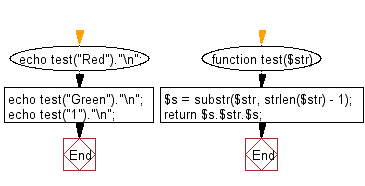



On 32-bit systems, the maximum length is 2 28 - 16 (~512MiB). In V8 (used by Chrome and Node), the maximum length is 2 29 - 24 (~1GiB).However, a string with this length needs 16384TiB of storage, which cannot fit in any reasonable device's memory, so implementations tend to lower the threshold, which allows the string's length to be conveniently stored in a 32-bit integer. The language specification requires strings to have a maximum length of 2 53 - 1 elements, which is the upper limit for precise integers.
#Php trim string length code#
For common scripts like Latin, Cyrillic, wellknown CJK characters, etc., this should not be an issue, but if you are working with certain scripts, such as emojis, mathematical symbols, or obscure Chinese characters, you may need to account for the difference between code units and characters. JavaScript uses UTF-16 encoding, where each Unicode character may be encoded as one or two code units, so it's possible for the value returned by length to not match the actual number of Unicode characters in the string. This property returns the number of code units in the string. Object.prototype._lookupSetter_() Deprecated.Object.prototype._lookupGetter_() Deprecated.Object.prototype._defineSetter_() Deprecated.Object.prototype._defineGetter_() Deprecated.Tip: The sentence have been truncated, so it may be recommended to put a "." to the end of truncated string so that end user will know it's part of longer article. If it is, just truncate it at the set limit. In this case, it's imperative to double check the length of the truncated string to check if it is longer than the limit. Some words may be extremely long where a single word may exceed the character limit set. If you're encountering this issue, use mb_strlen() function instead. In addition, together with some non-ASCII characters, these words may take up two bytes of data instead of just one, causing the strlen() function to calculate the length of the string longer than it's (resulting in shorter returned string). Note that if your string contains special characters or foreign languagessuch as Arabic, Chinese, Japanese, Korean, Russian and etc, it may not be possible to use a space character to split words. If code in example 3 does not return desired result, another variant above truncates the string at the nearest word under the maximum string length. $string = substr($string, 0, strpos(substr($string, 0, $length), ' ')) $string = substr($string,0,strpos($string,' ',$length)) Ĭode above will truncate the string at the first space after the desired length, useless for people who wants the string to have at least a minimum amount of characters, but immediately cut off right after the whole word exceeding the limit.
#Php trim string length full#
Again, the truncate boundary is the end of the last full word right before desired length of return string. Then, strpos() is used to know the exact length of the first line, allowing substr() to cut accurately without breaking apart a word. wordwrap() by default will split at the boundary right before maximum character limit so that the no word is broken apart. PHP code above uses the wordwrap() function to split the texts into multiple lines. $string = substr($string, 0, strpos(wordwrap($string, $length), "\n")) The above code will return a string which is cut off right after the last word before the last space before the maximum character limit is hit. Here are some examples of PHP algorithms that can be used to achieve the effect of not cutting off words into two parts while grabbing a portion of a string. It’s possible to re-code the PHP script to cut off the text at the end of the nearest last word before or after a certain number of characters in full so that it’s a complete word.

It may be more comprehensible for visitors to your site to read a complete and full word without been chopped off or broken apart in the middle into two, with the later part absent from the sentences after been cut off due to limited number of characters required. The situation is not an error, but by design, as most commands such as substr() simply return portion of string instructed by start position and length parameters. However, there is possibility that a word can be cut off in the middle of nowhere into two, making the separated word unintelligible. PHP has several functions which can truncate a string to grab a portion of the string up to certain number of characters.


 0 kommentar(er)
0 kommentar(er)
